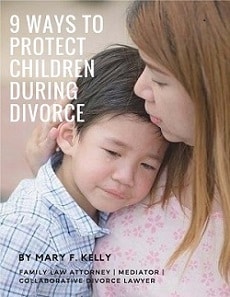Divorce usually involves distribution of assets such as house, cars, bank accounts, securities, and retirement funds. Sometimes another asset exists: cash. And sometimes the cash is significant in value.
If only one spouse acquires or knows about the cash, he or she may be tempted to hide it so it won’t be divided in the divorce. This happens more often than you might think. Cash is notoriously hard to trace, so the other spouse may suspect that there is cash hidden somewhere but not find it until after the divorce is final (if he or she is lucky enough to discover it at all!).
Hiding assets in divorce
There are many ways to hide assets, from hidden bank accounts to overpaying the IRS or credit cards and pocketing the refund. People make up loans from family members they have to pay off, then get the money back after the divorce. One client didn’t bother to hide money. He gave it away at a local bar, saying he wanted to spend his whole 401(k) so his wife wouldn’t get any of it. Some families store large amounts of cash at home or in a safe deposit box. If a divorce is looming and one spouse takes the cash, it’s very difficult to prove any money was there. There are law firms and financial professionals who specialize in finding hidden assets, especially in high-net worth divorces.
Is your spouse hiding money?
Most of the time large amounts of cash come from a business that takes in cash on a regular basis (often as unreported income). Retail businesses like restaurants, pizza parlors, gas stations and convenience stores generate cash. So do service businesses like dentist’s offices, auto repair shops, home improvement companies and interior decorators. These are just a few examples. If only one spouse is intimately involved with the business finances, the other spouse may not know how much of the business revenue is in cash or how much the business reports to the IRS as income. The person who puts cash into the safe and takes it out probably knows how much cash there is and has ample opportunity to hide it. If you know that your spouse saves cash, and especially if the amount is significant, you face some challenges when divorcing. You will need to take steps to ensure that the cash is disclosed on the net worth statements each spouse fills out and is divided fairly with your other assets.
Cash is one of the best ways to hide money from a spouse
Cash is a good way to hide money because it can be done in many ways. Your spouse could cash an inheritance check, then put the cash in a safe deposit box. Or get cash back on everyday purchases and store it casually in a dresser drawer. If a couple keeps a private safe in the home, it’s likely that cash is stored inside. But even if you know about the cash and where it is, your spouse could take it, then deny that it was ever there. Say you discuss divorce or one of you starts a divorce action. You go to the safe one day and discover $50,000.00 is missing. Without proof that it was there, that money will be nonexistent when you divide your assets in the divorce.
How to get proof of cash for financial discovery
First, once you know that your spouse is taking cash from the house (and he or she is not willing to regularly give you a share ), remove the secrecy. Make sure you know the combination to the safe. If possible, make a video of the cash in the safe. If you can, take the cash out and record the individual bills, or stacks of similar bills. Include in the video areas near the safe, in a room that is easy to identify (kitchen, bedroom, den, etc.). This step will make it very difficult for your spouse to deny the existence of, and to some extent, the amount of the cash. Twenty stacks of fifty 100-dollar bills can be quantified! If you don’t have the opportunity to take out the bills and make a video, document the cash with a very trustworthy witness, like your mother. Take photos or a video of her looking at the cash in the safe with you. Or simply take some or all of the cash. This is a radical step that could make your spouse angry or violent when he or she finds out. You could also be subject to penalties from the court for hiding assets in divorce.
If there is cash in the safe, your divorce attorney may be able to seek a restraining order directing the sheriff or police to remove the safe immediately from the home and impound it in a secure location. Once that happens, the court will order the safe to be opened and the contents disclosed. However, if your spouse gets any inkling of your plans, he or she may remove the cash, or the safe, first.
Cash from criminal activity
Large sums of cash could be the result of criminal activity: selling drugs, or stealing from or cheating clients or customers. If you have reason to believe your spouse is obtaining cash from such sources, and hiding it in, for example, a family safe, you should seek legal counsel right away. You could indirectly become implicated in a criminal charge, especially if you take some of the money. If your spouse says the cash is the result of cashing clients’ checks at the bank, you should acquaint yourself with federal and state regulations governing banks’ check cashing practices.
If your spouse appears to be siphoning significant amounts of cash from a business and declaring unusual or suspiciously low income on his or her tax returns, consider filing separate returns. You do not want to be part of tax issues like fraud or failure to report income that could come to the attention of the IRS.
Financial dishonesty in marriage
There are different opinions of whether hiding money from your spouse while you are married is dishonest or unfaithful. Some say saving money in your own name means you are planning for divorce. Others say it is smart in case you do get a divorce and your spouse engages in “spousal starving,” or refusing access to any money once he or she finds out you want a divorce. That said, hiding money on a regular basis, whether you are planning for divorce or not, doesn’t build the foundation of a good marriage. Once either spouse starts a divorce action, or you begin to work with a mediator or collaborative divorce attorneys, both spouses are required to disclose all of their finances. Concealing an asset (like cash) can result in financial penalties and sanctions from the court.
Copyright 2020 by Kelly & Knaplund




